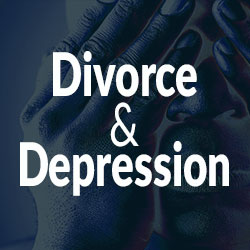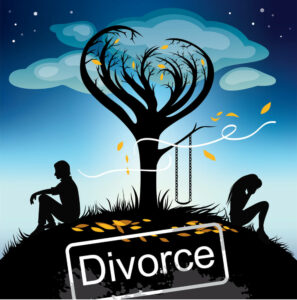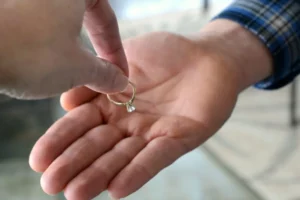Divorce is a difficult process, both emotionally and legally. It can be even more difficult when you are dealing with depression after divorce. This can be an incredibly challenging time, but it is important to remember that you are not alone. There are many people who have gone through the same thing and survived. In this blog post, we will discuss some of the best ways to deal with depression after divorce and get your life back on track!
Contents
Defining Depression After Divorce
 Divorce is one of the most difficult life transitions that anyone can go through. It is a time of sadness, loss, and grief. For many people, divorce also leads to depression. Depression is more than just feeling sad or down. It is a real medical condition that can impact every aspect of your life. It is characterized by persistent feelings of sadness, hopelessness, worthlessness, and/or fatigue. Depression can make it difficult to eat, sleep, work, or enjoy activities that you used to love.
Divorce is one of the most difficult life transitions that anyone can go through. It is a time of sadness, loss, and grief. For many people, divorce also leads to depression. Depression is more than just feeling sad or down. It is a real medical condition that can impact every aspect of your life. It is characterized by persistent feelings of sadness, hopelessness, worthlessness, and/or fatigue. Depression can make it difficult to eat, sleep, work, or enjoy activities that you used to love.
When someone is going through a divorce, it is common for them to feel a range of emotions. These can include sadness, anger, anxiety, and relief. It is normal to feel all of these things and more. However, for some people, these emotions can be so overwhelming that they develop depression. If you are feeling depressed after your divorce, it is important to seek help.
The major difference in symptoms between “normal” grief and depression is that, with depression, these symptoms do not go away after a period of time. Grief is often described as a roller coaster, with ups and downs. But with depression, the lows are more persistent and can last for weeks or longer.
Signs And Symptoms
 The symptoms of depression can be particularly tough to deal with after a divorce. Some of the most common symptoms include:
The symptoms of depression can be particularly tough to deal with after a divorce. Some of the most common symptoms include:
- Persistent feelings of sadness, hopelessness, or worthlessness
- Loss of interest in activities that you used to enjoy
- Sleep problems (either sleeping too much or not being able to sleep)
- Changes in appetite (usually eating more or less than usual)
- Fatigue or loss of energy
- Difficulty concentrating, remembering, or making decisions
- Feelings of guilt, worthlessness, or helplessness
- Thoughts of death or suicide
If you are experiencing any of these symptoms, it is important to seek help. Depression is a
Factors That Influence Depression After Divorce
Divorce is accompanied by a number of additional factors that can influence the development of depression. These can include instances such as:

- Loss of support system: When you get divorced, you often lose your partner’s support system. This can be a significant loss, especially if you were relying on your partner for emotional support.
- Abuse: Unfortunately, abuse is a factor in many divorces. If you were a victim of abuse, you may be at an increased risk of developing depression after your divorce.
- Unjustified blame: In some cases, one spouse may unfairly blame the other for the divorce. This can lead to feelings of guilt and shame, which can trigger depression.
- Relocation: If you have to move as a result of your divorce, it can be difficult to leave your support system behind. This can be a major adjustment and can lead to feelings of isolation and loneliness.
- Adjustments with your ex’s new partner: If your ex-partner has already moved on and is in a new relationship, it can be difficult to see them happy with someone else. This can trigger feelings of jealousy, envy, and insecurity.
- Pressure to re-marry: There is a lot of societal pressure to re-marry after divorce. This can be especially difficult if you are not ready to date again or if you have been through multiple divorces.
- Unsupportive families: Unfortunately, not all families are supportive after a divorce. Some family members may judge you or make you feel like a failure. This can be very difficult to deal with. For example, if you have young children, you may feel like you are not doing a good job as a parent.
- Change in lifestyle: Divorce often leads to a change in lifestyle. This can be a major adjustment, especially if you were used to a certain lifestyle during your marriage.
- Financial stress: Divorce can be a financial strain on both parties. Divorce can be a very expensive process. You may have to pay for lawyers, court fees, and the cost of setting up two separate households. This can be difficult to deal with, especially if you are not used to being on your own financially.
- Loss of custody: If you have children, divorce can mean that you no longer have custody of them. This can be a devastating loss, especially if you are very close to your children.
These are just a few of the factors that can influence the development of depression after divorce. It is important to remember that everyone experiences divorce differently and there is also no “right” or “wrong” way to feel. Divorce is a very personal and unique experience. If you are struggling to cope with your divorce, it is important to seek professional help.
Consequences
From what we read above, it is evident that divorce has serious consequences, not just for the individuals involved, but also for society as a whole. The overall toll of divorce can be devastating. Some consequences of divorce include:
- feeling isolated and alone
- feeling like a failure
- having a sense of shame and humiliation
- feeling angry, resentful, and bitter towards your ex
- struggling with anxiety and depression
- having difficulty sleeping or eating
- experiencing financial instability
These are just some of the more common fallout effects of divorce. While these may seem daunting, they carry the potential to be more serious and life-altering. If left unchecked, these can eventually lead to:
- post-traumatic disorder
- obsessive-compulsive disorder
- eating disorders
- personality disorders
- increase in substance abuse
- tendency to engage in criminal activities
- homelessness
- suicide
As you can see, the emotional fallout of divorce can be significant. It is important to understand these risks and take steps to protect yourself.
Ways To Manage
The key to dealing with the emotional fallout of divorce is to address these issues head-on. It is important to seek professional help if you are unable to manage your mental health by yourself.
Stay in touch with your lawyer
Along with managing emotions, managing the logistics of a divorce is equally important. This is why it is crucial to stay in touch with your lawyer. They will be able to help you understand and navigate the legal process, which can be complicated and overwhelming. Be sure to maintain transparency about all the aspects of your divorce so that your lawyer can help you to the best of their ability.
Stay cordial with your ex
 While this may seem like a no-brainer, it is important to remember that your ex is now a part of your past. It is crucial to keep things civil between the two of you, especially if you have children. Divorce can be hard on kids, and they need to see that their parents can still get along.
While this may seem like a no-brainer, it is important to remember that your ex is now a part of your past. It is crucial to keep things civil between the two of you, especially if you have children. Divorce can be hard on kids, and they need to see that their parents can still get along.
Moreover, it can also help in maintaining a better relationship with your ex, which can make co-parenting a lot easier.
Keep communication with your children
Children tend to get side-looked when it comes to dealing with the emotional fallout of divorce. However, it is essential to keep communication lines open with your children and ensure that they understand what is happening. You can even get them counseling to help them deal with the situation in a healthy way.
Form a routine
Going through a divorce can make your daily life feel like a complete mess. This is why it is essential to form some sort of routine to help you feel grounded and stable. This can be something as simple as making your bed every morning or going for a walk every evening. Having a set routine will help you feel more in control of your life during this chaotic time.
Build a support system
Separating from your spouse is bound to make you feel isolated and alone. This is why it is essential to build a support system of close friends or family members who you can rely on. These people can provide you with the emotional support that you need during this difficult time.
You can even extend your social circle by further joining a club or group that shares your interests. This can help you meet new people and form new relationships.
Prioritize yourself
Losing your significant other can make you feel like you have lost a part of yourself. This is why it is essential to prioritize your own well-being during this time. Make sure to take care of yourself physically, mentally, and emotionally. This can be done by eating healthy, exercising, and spending time doing things that make you happy.
Do not hesitate to ask for help
It is impossible and burdening to do everything by yourself. This is why it is okay to ask for help from people. For example, if you need someone to help with the kids or with the housework, do not hesitate to ask.
Relying on others is not a sign of weakness; it is a sign of strength. So, do not be afraid to ask for help when you need it.
Consider therapy
 Lastly, if your emotions seem to need some extra help, do not be afraid to seek professional help. A therapist can provide you with the tools and support that you need to deal with your emotions.
Lastly, if your emotions seem to need some extra help, do not be afraid to seek professional help. A therapist can provide you with the tools and support that you need to deal with your emotions.
Dealing with the emotional fallout of divorce is no easy task. However, by following these tips, you can make it through this tough time. Remember to take things one day at a time and to be patient with yourself. Things will eventually get better.
These are just a few of the ways that divorce can negatively impact individuals and society. It is important to remember that divorce is not always bad. However, in some cases, it may be the best thing for both parties. However, it is important to be aware of the potential consequences of divorce before making the decision to end your marriage.
Conclusion
Conclusively, we can say that depression after divorce is a reality for many individuals. It is important to be aware of the emotional fallout that can occur after a divorce and to take steps to protect yourself. If you are considering divorce, it is important to seek professional help. This is a big decision and it should not be taken lightly. There are a number of resources available to help you make this decision. If you are further struggling to cope with your divorce, it is important to seek professional help.
If you or someone you know is looking for psychological help, Therapy Mantra is here for you. We are the leading providers of online therapy and counseling. Our team of highly trained and experienced therapists can provide assistance at the most affordable rates. Contact us today to learn more about our services. You may also visit our website to book an online therapy session or download our free Android or iOS app for more information.


